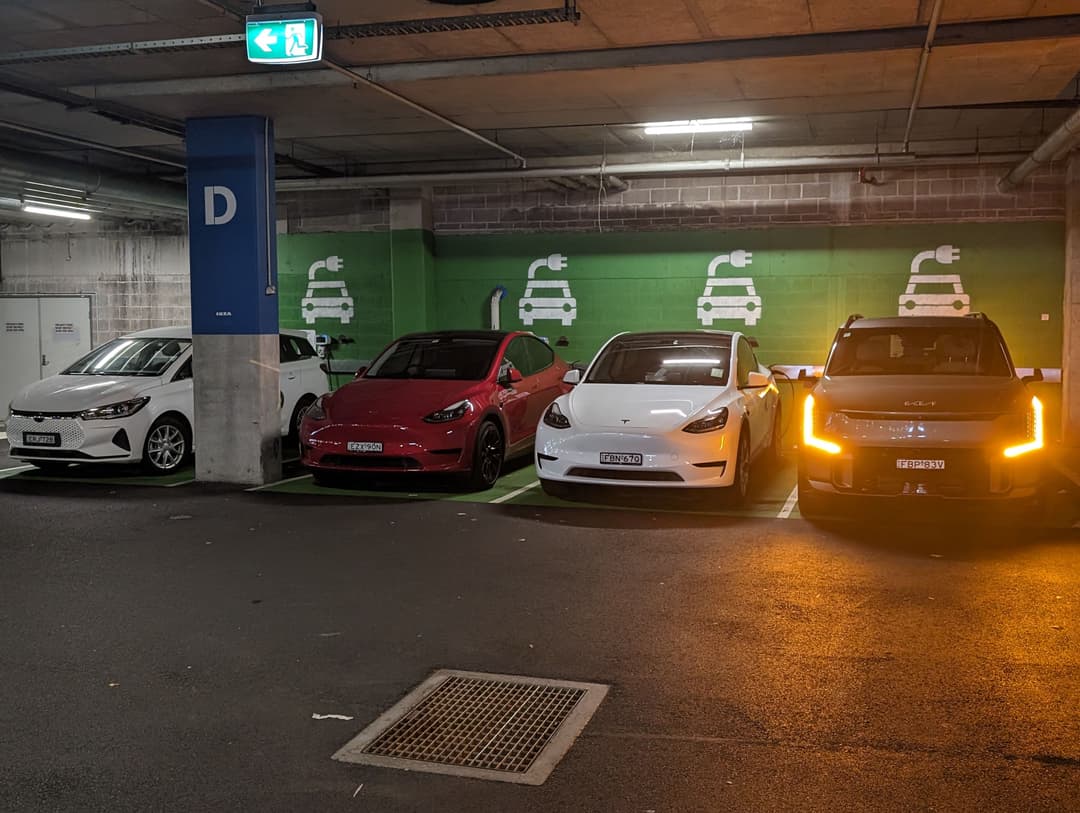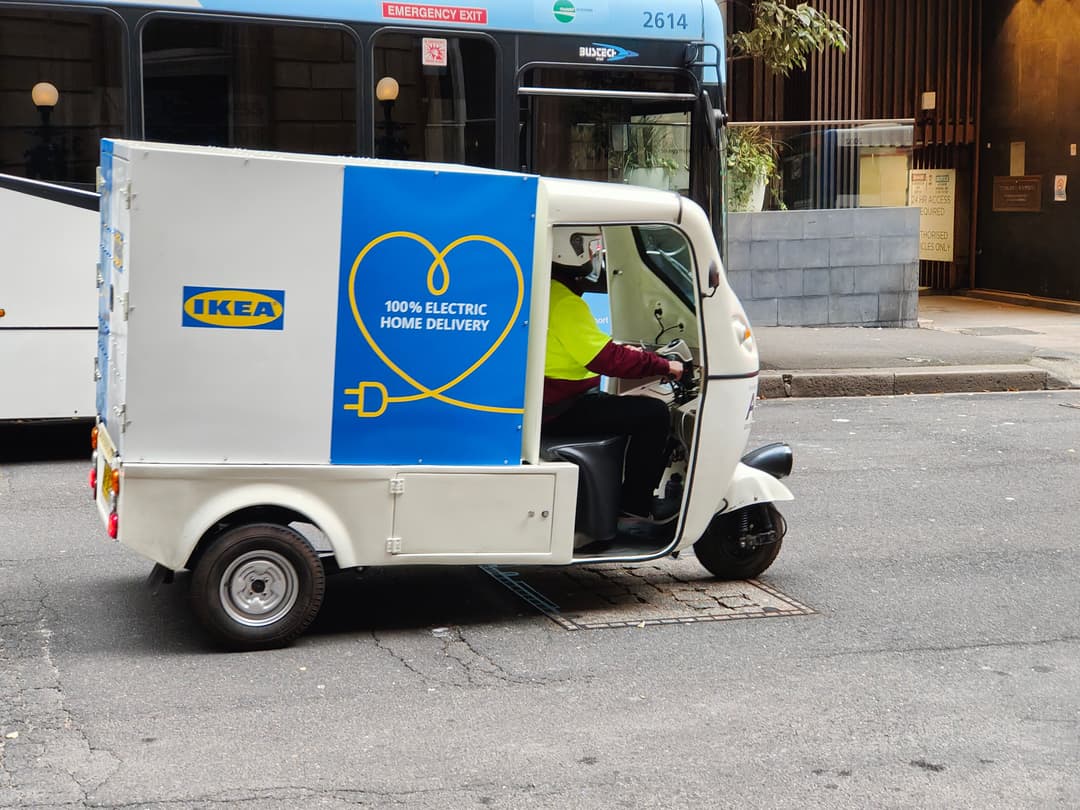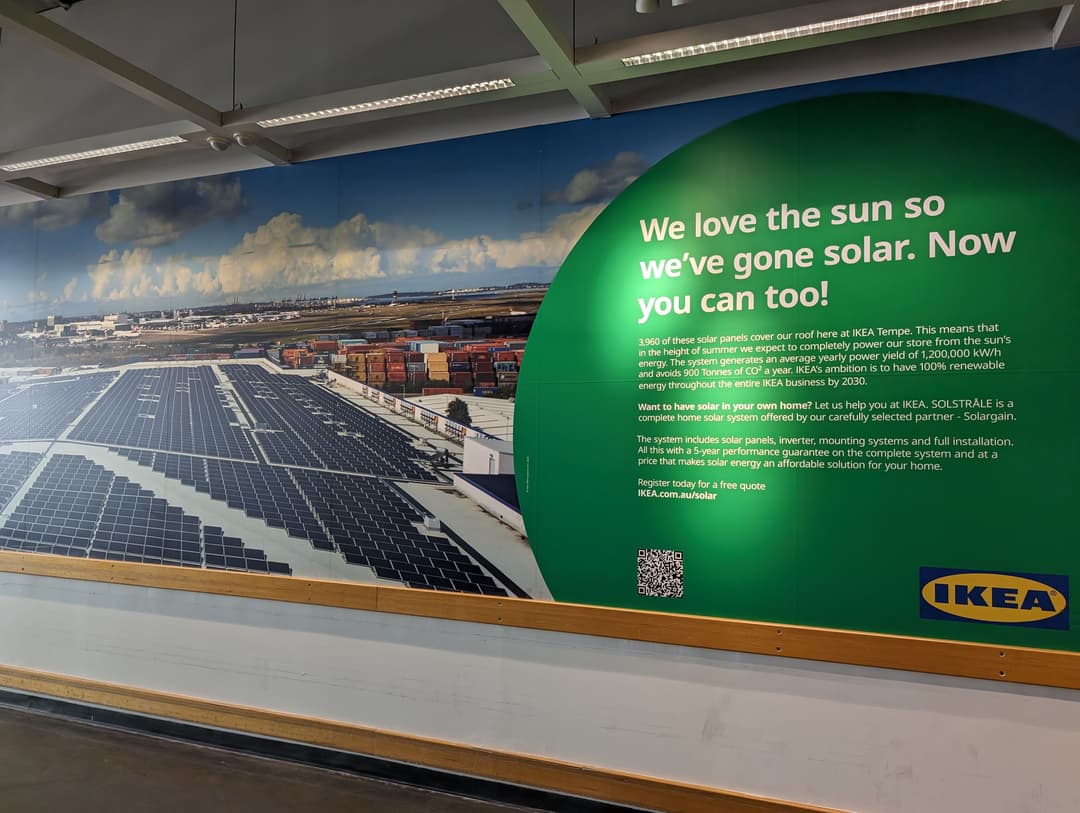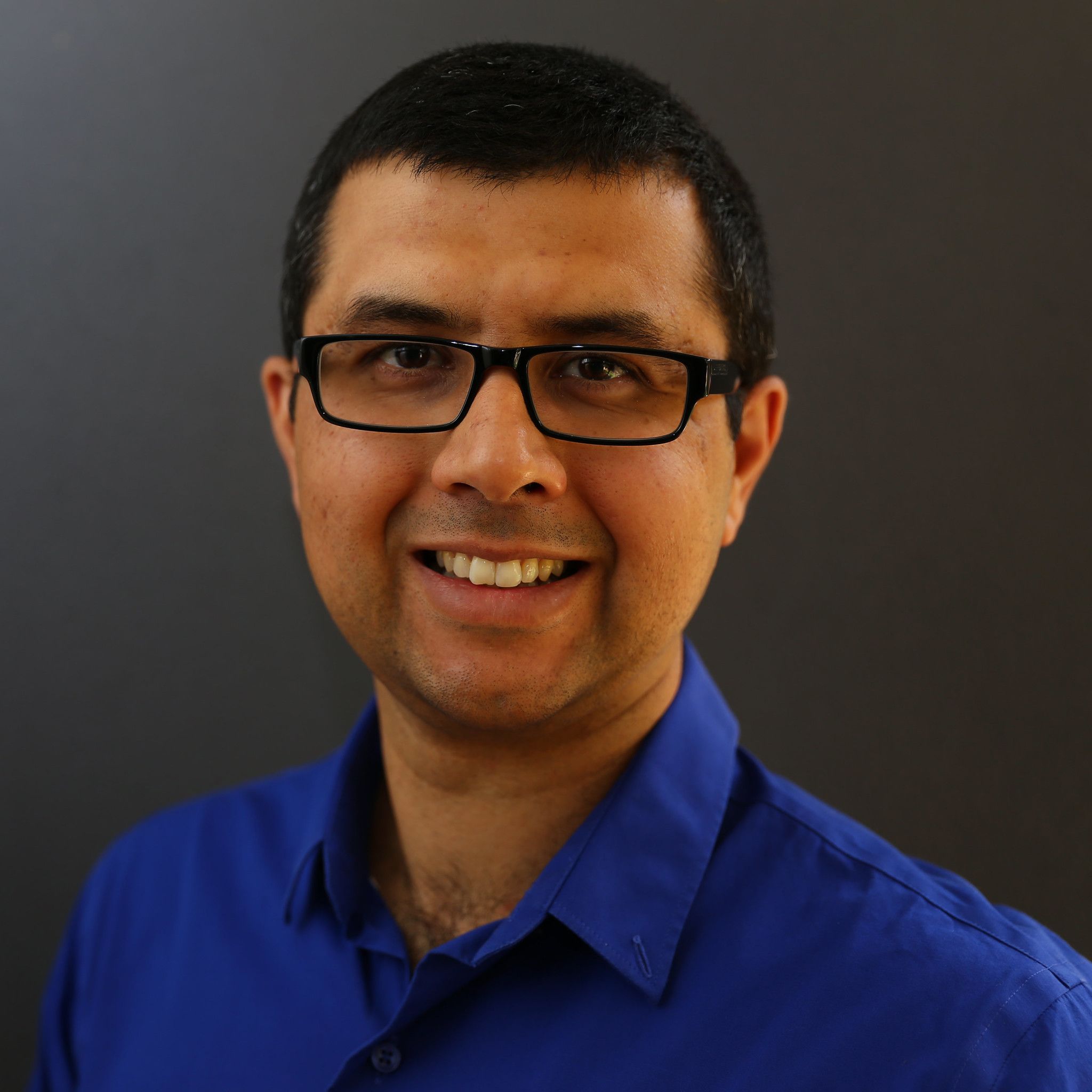IKEA Australia leading the way with EV charging, fleet electrification and solar rollout
Neerav Bhatt from zecar spoke with Peter Richmond, IKEA Australia Sustainability Lead this week to learn about their plans for EV charging, electrification of stores, solar generation on and offsite as well as electrification of last mile deliveries. All of these are mentioned in the IKEA Australia Sustainability Report 2023.
EV Charging at IKEA Stores
IKEA Australia aims to support customers and their workers in taking steps to reduce their own personal transport emissions.
At present they have 29 x 22kW AC public charging ports on the Chargefox network across the country at 8 out of 10 stores. All IKEA Australia stores will have AC Chargers for public use during store operating hours by 2025.
They are currently considering what to do next about customer EV charging facilities as part of their 5 year plan.

For a long time IKEA AC chargers were free, the company felt that was appropriate in the early days to encourage EV take up.
As of 1st March 2024 all AC 22kW chargers at IKEA stores Australia wide charge 30 cents/kWh which is a fair price.
Richmond explained the reasoning for the change:
“It’s important that we charge for EV charging because electricity is not free. In order to drive the transition EV infrastructure needs to be maintained and increased to encourage people to buy more electric vehicles”.
Zecar supports this move as putting a price on charging improves EV charging behaviour and improves access for more EV drivers across the day.
There is no plan at present for idle fees at IKEA AC chargers, usage data will be analysed over time to see how customer behaviour has changed now that AC charging isn’t free.
Regarding the Evie DC fast chargers at IKEA Tempe, that was a specific project for that store as part of a way of investigating what kinds of chargers are needed for IKEA customers in the future.
IKEA has no public comment at the moment about whether they will host more DC fast chargers at their stores in the future.
Richmond commented about the future:
“We know that EVs are going to make up more of the car market and we want to match customer expectations on charging infrastructure. If 50% of customers are driving EVs then they will expect more chargers to be available”.
zecar readers would like to know when do you expect the IKEA Marsden Park EV chargers to be working again and more broadly do you have a maintenance agreement with a company like EVSE or Jetcharge?
IKEA's Zero Emission Project Manager replied:
"We are in the process of updating our maintenance schedules and partners for regular servicing of our EV chargers".
"There have been some complexities with the Marsden Park chargers, but we are aiming to have these working as soon as possible."
Electric Last Mile Delivery
By 2025, IKEA Australia is aiming for 100% of customer orders to be delivered using zero emission vehicles.
They are accelerating to meet that target, investing heavily in onsite charging infrastructure for last mile deliveries e.g.: dedicated 22kW IKEA truck EV chargers. They will put in faster 60-100kW units where needed
IKEA has been trialling various innovative zero emissions vehicles across the globe, including electric rickshaws in India, cargo bikes in Madrid, solar bikes in London and barges down the Seine in Paris. and a 3 month trial of e-tuk tuks in Australia.

In Australia last year they trialled parcel deliveries via e-tuk tuks, named Tük-se and Tack-se (‘tack’ meaning ‘thanks’ in Swedish) by co-workers
In partnership with ANC Delivers, the three wheeled e-tuk tuks were powered by 9kWh swappable batteries, undertaking parcel deliveries in a 10km radius from the IKEA Tempe store.
IKEA Australia has seen their zero-emission delivery fleet grow to more than 40 vehicles across New South Wales, Queensland, and Victoria and South Australia, in collaboration with our transport partners, ANC Delivers, All Purpose Transport, and Kings Transport.
However, there are significant challenges in Australia when it comes to the electrification of road freight, including the cost, range, and performance of zero emission vehicles, charging infrastructure, availability, and supply of equipment.
They are working closely with the industry as a member of the Electric Vehicle Council, the broader business community, all levels of government, and other stakeholders to share learnings and come up with solutions to overcome these challenges.
Electrification of Stores & Solar Generation
IKEA believe the future of energy is renewable.
That’s why they’re phasing out fossil fuels, investing in renewable energy and switching to renewable heating and cooling in their buildings. They will have converted all 10 IKEA stores from gas to electric by 2030, most are already converted. In addition, IKEA Australia has committed to 100% renewable electricity to power retail operations by 2025.
They will do this firstly through on-site generation, investing heavily in onsite solar projects to further increase the solar panels across stores and distribution centres, taking advantage of the expansive rooftops and car park spaces.

Secondly, they will acquire and voluntarily surrender market renewable energy certificates, in line with Clean Energy Regulator requirements.
During 2022, they completed two renewable heating and cooling projects at the IKEA Adelaide and Richmond stores. These projects replaced the air conditioning systems to remove gas energy supply to allow stores to be capable of operating on 100% renewable energy. A similar project at the Rhodes (Sydney) store took place during 2023.
In 2023, they celebrated the commissioning of Australia’s largest commercial microgrid at IKEA Adelaide.
This project supports the goal of 100% renewable electricity consumption by the Adelaide store by 2025 and generates clean energy for the Adelaide community - up to 370 homes a year.
The IKEA eleXys Microgrid is the combination of the PV (Photo Voltaic) panels installed on the store’s rooftop and carpark, and the BESS (Battery Energy Storage System), working to supply the IKEA store with energy first, then as a local energy production and distribution network.
This project is a collaboration between IKEA Australia, Planet Ark Power, Epic Energy, SA Power Networks, and the South Australian Government.
IKEA is committed to becoming a circular and climate positive business by 2030, but they can’t do it alone. The IKEA eleXsys microgrid project is a great example of collaboration, where like minded partners from the business community, industry and government have come together to help shift the dial on clean energy production in Australia.
At the moment IKEA Australia has 23,000 solar panels for a total of 8 megawatts generation capacity .
Across 2024-2025 the plan is to add an extra 2.5 megawatts at 4 IKEA sites across buildings and car parks. Adelaide has a 650kW carpark solar structure that will be activated soon.
The company goal is to completely maximise onsite generation across all sites including investigation of possible battery systems, every year batteries are getting better. They have learnt a lot from their Adelaide eleXys Microgrid.
In 2023 Ingka Investments, the investment arm of Ingka Group, announced the purchase of two operational solar PV parks in Peak Hill and Trundle, in central-west New South Wales. A third solar PV park is currently under development and is expected to start producing electricity at the end of 2025.
The total production of the three solar parks will be approximately 340 GWh per year, which is equivalent to the electricity consumption of roughly 65,000 Australian households.
Ingka Investments also announced a 15% stake in Australia’s largest wind farm, Golden Plains Wind Farm, located in Victoria. The investment in Australia secures long-term access to renewable energy that can support the transition of local IKEA retail operations. In future, this may extend to other value chain partners and even customers. The aim is to contribute to a further reduction in the overall Ingka Group climate footprint.
About the author

Neerav Bhatt has been a technology journalist and photographer for over 20 years appearing in online, print, radio and TV media. His current focus is on helping Australians switch to electric vehicles as well as making their home fully electric, sustainable and climate resilient. Youtube: www.youtube.com/@NeeravBhatt Web: neeravbhatt.com
Stay up to date with the latest EV news
- Get the latest news and update
- New EV model releases
- Get money savings-deal





